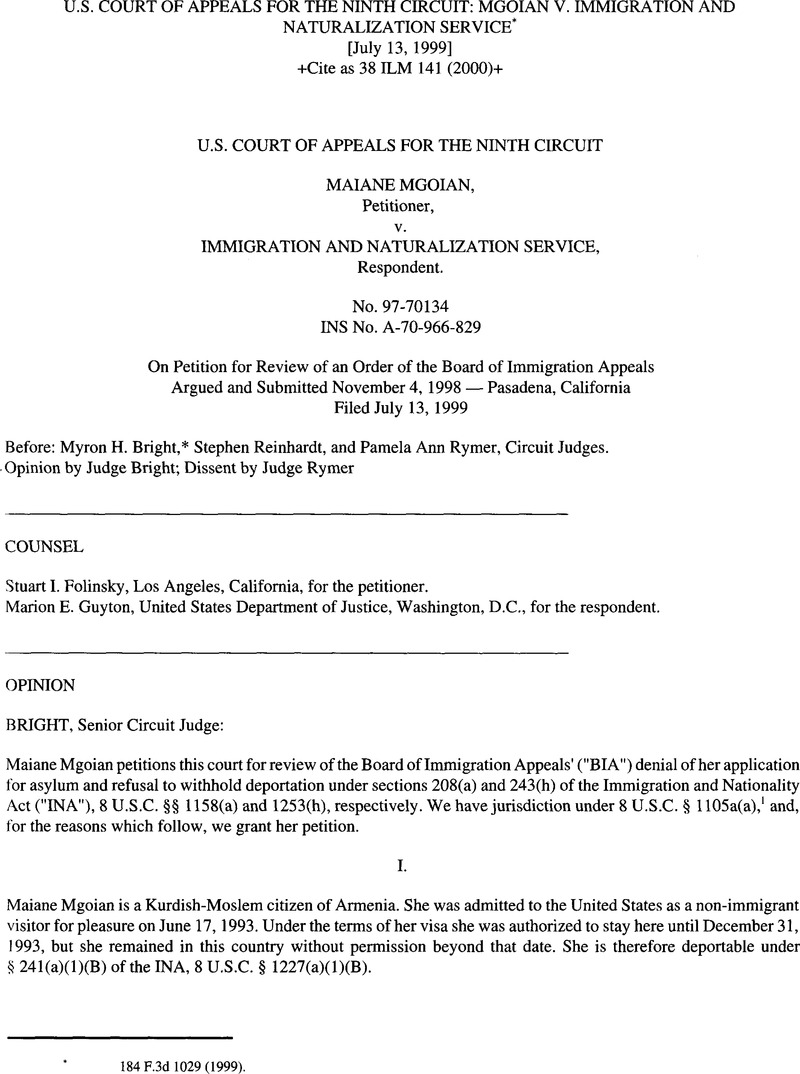No CrossRef data available.
Published online by Cambridge University Press: 27 February 2017

184 F.3d 1029 (1999).
1 The Illegal Immigration Reform and Immigrant Responsibility Act of 1996 (“IIRIRA“), Pub. L. No. 104-208,110 Stat. 3009 (Sept. 30, 1996), amended by Act of Oct. 11, 1996, Pub. L. No. 104-302, 110 Stat. 3656, repealed 8 U.S.C. § 1105a (1994) and replaced it with a new judicial review provision. See IIRIRA § 306. As the new provision does not apply to proceedings that commenced before April 1,1997, this Court has jurisdiction over this petition under 8 U.S.C. § 1105a. See IIRIRA § 309(c).
2 Armenia has a total population near three million, of whom approximately ninety percent are both racially Armenian and religiously Christian. As of 1990, only an estimated 10,000 Kurdish-Moslems were resident in Armenia. After the collapse of the Soviet empire that number fell to approximately 1,000. Admin.R. at 69.
3 Azerbaijan, which is predominately Moslem, fought a bloody war with Armenia in the early-1990's over the enclave of Nagorno-Karabakh.
4 Failing that, if the applicant is a member of a “disfavored” group, but the group is not subject to systematic persecution, this court will look to (1) the risk level of membership in the group (i.e., the extent and the severity of persecution suffered by the group) and (2) the alien's individual risk level (i.e., whether the alien has a special role in the group or is more likely to come to the attention of the persecutors making him a more likely target for persecution). See Kotasz, 31 F.3d at 853. The relationship between these two factors is correlational; that is to say, the more serious and widespread the threat of persecution to the group, the less individualized the threat of persecution needs to be. See id. at 853-54. Because we conclude that Mgoian effectively established a pattern or practice claim with respect to her family group and its inclusion in Kurdish-Armenia's intelligentsia, it is unnecessary for us to pursue this alternative analysis.
5 Since we grant Mgoian relief on this basis, it is unnecessary for us to consider her second claim — namely that the proceedings against her should have been abandoned because the IJ “coerced” a concession of deportability from her attorney.
1 8 U.S.C. § 1101(a)(42)(A) defines “refugee” as a person unwilling to return to her country “because of persecution or a well-founded fear of persecution on account of race, religion, nationality, membership in a particular social group, or political opinion.” 8 C.F.R. § 208.13, “Establishing asylum eligibility,” states in relevant part: (b)(2) Well-founded fear of persecution. An applicant shall be found to have a well-founded fear of persecution if he or she can establish first, that he or she has a fear of persecution in his or her country of nationality or last habitual residence on account of race, religion, nationality, membership in a particular social group, or political opinion; second, that there is a reasonable possibility of suffering such persecution if he or she were to return to that country; and third, that he or she is unable or unwilling to return to or avail himself or herself of the protection of that country because of such fear …. [T]he asylum officer or immigration judge shall not require the applicant to provide evidence that he or she would be singled out individually for persecution if: (i) The applicant establishes that there is a pattern or practice in his or her country of nationality or last habitual residence of persecution of a group of persons similarly situated to the applicant on account of race, religion, nationality, membership in a particular social group, or political opinion; and (ii) The applicant establishes his or her own inclusion in and identification with such group of persons such that his or her fear of persecution upon return is reasonable. Counsel, Curtis, Mallet-Prevost, Colt & Mosle LLP, Washington, D.C, former Senior Legal Adviser, International Centre for Settlement of Investment Disputes (ICSID), ILM Corresponding Editor for International Arbitration.